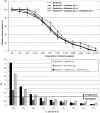Extracts from Traditional Chinese Medicinal Plants Inhibit Acetylcholinesterase, a Known Alzheimer's Disease Target - PubMed (original) (raw)
Extracts from Traditional Chinese Medicinal Plants Inhibit Acetylcholinesterase, a Known Alzheimer's Disease Target
Dorothea Kaufmann et al. Molecules. 2016.
Abstract
Inhibition of acetylcholinesterase (AChE) is a common treatment for early stages of the most general form of dementia, Alzheimer's Disease (AD). In this study, methanol, dichloromethane and aqueous crude extracts from 80 Traditional Chinese Medical (TCM) plants were tested for their in vitro anti-acetylcholinesterase activity based on Ellman's colorimetric assay. All three extracts of Berberis bealei (formerly Mahonia bealei), Coptis chinensis and Phellodendron chinense, which contain numerous isoquinoline alkaloids, substantially inhibited AChE. The methanol and aqueous extracts of Coptis chinensis showed IC50 values of 0.031 µg/mL and 2.5 µg/mL, therefore having an up to 100-fold stronger AChE inhibitory activity than the already known AChE inhibitor galantamine (IC50 = 4.33 µg/mL). Combinations of individual alkaloids berberine, coptisine and palmatine resulted in a synergistic enhancement of ACh inhibition. Therefore, the mode of AChE inhibition of crude extracts of Coptis chinensis, Berberis bealei and Phellodendron chinense is probably due to of this synergism of isoquinoline alkaloids. All extracts were also tested for their cytotoxicity in COS7 cells and none of the most active extracts was cytotoxic at the concentrations which inhibit AChE. Based on these results it can be stated that some TCM plants inhibit AChE via synergistic interaction of their secondary metabolites. The possibility to isolate pure lead compounds from the crude extracts or to administer these as nutraceuticals or as cheap alternative to drugs in third world countries make TCM plants a versatile source of natural inhibitors of AChE.
Keywords: Alzheimer’s; Coptis; Traditional Chinese Medicine; acetylcholinesterase; acetylcholinesterase inhibitor; berberine; coptisine; isoquinoline alkaloids; natural products; palmatine.
Conflict of interest statement
The Authors declare that they have no conflicts of interest to disclose. This research received no specific grant from any funding agency in the public, commercial or not-for-profit sectors.
Figures
Figure 1
HPLC-MS total ion current chromatogram of a methanol extract of Coptis chinensis. Peaks: 1: Tetradehydroscoulerine / tetrahydrocheilanthifolinium (m/z = 322); 2: columbamine (m/z = 338); 3: epiberberine (m/z = 336); 4: coptisine (m/z = 320); 5: palmatine (m/z = 352); 6: berberine (m/z = 336).
Figure 2
AChE inhibitory effect and synergistic effects of berberine in combination with coptisine and palmatine. The combination of berberine with other alkaloids inhibits ACh stronger than berberine alone (top); The combination index (CI) increases with higher concentrations of berberine (bottom). Data is shown as mean ± SD from three individual experiments, each carried out in triplicates.
Figure 3
Alkaloids contained in Coptis chinensis.
Similar articles
- Synergistic Inhibition of Acetylcholinesterase by Alkaloids Derived from Stephaniae Tetrandrae Radix, Coptidis Rhizoma and Phellodendri Chinensis Cortex.
Kong XP, Liu EYL, Chen ZC, Xu ML, Yu AXD, Wu QY, Xia YJ, Duan R, Dong TTX, Tsim KWK. Kong XP, et al. Molecules. 2019 Dec 13;24(24):4567. doi: 10.3390/molecules24244567. Molecules. 2019. PMID: 31847089 Free PMC article. - Anti-Acetylcholinesterase Activities of Mono-Herbal Extracts and Exhibited Synergistic Effects of the Phytoconstituents: A Biochemical and Computational Study.
Balkrishna A, Pokhrel S, Tomer M, Verma S, Kumar A, Nain P, Gupta A, Varshney A. Balkrishna A, et al. Molecules. 2019 Nov 18;24(22):4175. doi: 10.3390/molecules24224175. Molecules. 2019. PMID: 31752124 Free PMC article. - An in vitro AChE inhibition assay combined with UF-HPLC-ESI-Q-TOF/MS approach for screening and characterizing of AChE inhibitors from roots of Coptis chinensis Franch.
Zhao H, Zhou S, Zhang M, Feng J, Wang S, Wang D, Geng Y, Wang X. Zhao H, et al. J Pharm Biomed Anal. 2016 Feb 20;120:235-40. doi: 10.1016/j.jpba.2015.12.025. Epub 2015 Dec 24. J Pharm Biomed Anal. 2016. PMID: 26760241 - Traditional Chinese medicinal herbs as potential AChE inhibitors for anti-Alzheimer's disease: A review.
Jiang Y, Gao H, Turdu G. Jiang Y, et al. Bioorg Chem. 2017 Dec;75:50-61. doi: 10.1016/j.bioorg.2017.09.004. Epub 2017 Sep 6. Bioorg Chem. 2017. PMID: 28915465 Review. - Natural products as sources of new lead compounds for the treatment of Alzheimer's disease.
Huang L, Su T, Li X. Huang L, et al. Curr Top Med Chem. 2013;13(15):1864-78. doi: 10.2174/15680266113139990142. Curr Top Med Chem. 2013. PMID: 23931437 Review.
Cited by
- Cholinesterase and Tyrosinase Inhibitory Potential and Antioxidant Capacity of Lysimachia verticillaris L. and Isolation of the Major Compounds.
Özgen U, Şener SÖ, Šmejkal K, Vaclavik J, Şenol Denİz FS, ErdoĞan Orhan İ, Svajdlenka E, C GÖren A, ŽemliČka M. Özgen U, et al. Turk J Pharm Sci. 2020 Oct;17(5):528-534. doi: 10.4274/tjps.galenos.2019.71598. Epub 2020 Oct 30. Turk J Pharm Sci. 2020. PMID: 33177934 Free PMC article. - Synthesis and fluorescent properties of boroisoquinolines, a new family of fluorophores.
Sóvári D, Kormos A, Demeter O, Dancsó A, Keserű GM, Milen M, Ábrányi-Balogh P. Sóvári D, et al. RSC Adv. 2018 Nov 15;8(67):38598-38605. doi: 10.1039/c8ra08241c. eCollection 2018 Nov 14. RSC Adv. 2018. PMID: 35559080 Free PMC article. - Neuroprotective Natural Products for Alzheimer's Disease.
Chen X, Drew J, Berney W, Lei W. Chen X, et al. Cells. 2021 May 25;10(6):1309. doi: 10.3390/cells10061309. Cells. 2021. PMID: 34070275 Free PMC article. Review. - Selected Natural Products in Neuroprotective Strategies for Alzheimer's Disease-A Non-Systematic Review.
Wojtunik-Kulesza K, Oniszczuk T, Mołdoch J, Kowalska I, Szponar J, Oniszczuk A. Wojtunik-Kulesza K, et al. Int J Mol Sci. 2022 Jan 21;23(3):1212. doi: 10.3390/ijms23031212. Int J Mol Sci. 2022. PMID: 35163136 Free PMC article. Review. - Network Medicine for Alzheimer's Disease and Traditional Chinese Medicine.
Jarrell JT, Gao L, Cohen DS, Huang X. Jarrell JT, et al. Molecules. 2018 May 11;23(5):1143. doi: 10.3390/molecules23051143. Molecules. 2018. PMID: 29751596 Free PMC article. Review.
References
- Alzheimer’s Disease International World Alzheimer Report 2015. [(accessed on 10 August 2016)]. Available online: https://www.alz.co.uk/research/WorldAlzheimerReport2015.pdf.
MeSH terms
Substances
LinkOut - more resources
Full Text Sources
Other Literature Sources
Medical


